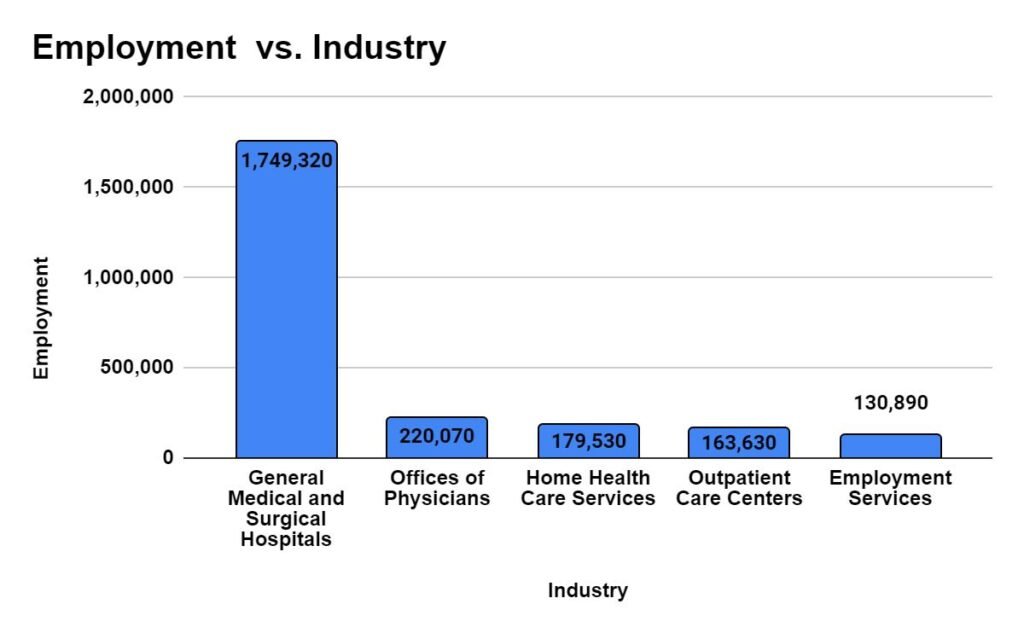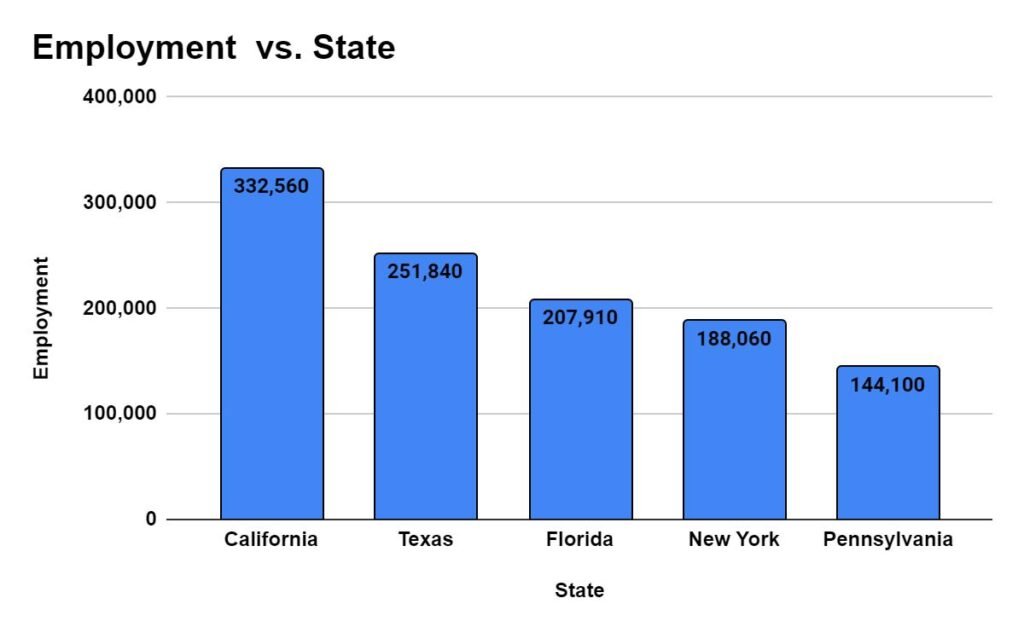Registered nurses (RNs) are the backbone of the healthcare system, they play a crucial role in ensuring patient well-being, and their dedication deserves proper compensation. But how much do RNs actually make in the USA?
This article explores the world of RN salaries, delving into the factors that affect nurses earning potential and offering tips to maximize nurses income.
Defining the Registered Nurse:
Here’s a breakdown of registered nurse (RN) key responsibilities and qualifications:
Direct Patient Care: RNs assess patients’ physical and mental health, administer medications, monitor vital signs, and perform skilled medical procedures (injections, catheters).
Treatment Coordinators: RNs collaborate with healthcare professionals to develop and implement treatment plans.
Patient Education: Explaining diagnoses, treatment options, medications, and self-care strategies.
Licensing and Education:
You must complete an accredited nursing program. This can be an associate’s degree in nursing (ADN), a bachelor’s degree in nursing (BSN), or a diploma program from a hospital school of nursing.
You must pass the National Council Licensure Examination for Registered Nurses (NCLEX-RN) to obtain your state nursing license.

Registered Nurse Salary: A Spectrum of Opportunity
The good news is that registered nursing is a well-paying profession. According to the U.S. Bureau of Labor Statistics1, the annual median salary for registered nurses is $86,070.
However, Registered Nurses have the potential to earn significantly more, with salaries ranging from $63,720 to $132,680 annually.
Top 10% earners: Exceed $132,680 annually
Bottom 10% earners: Make less than $63,720 annually
Projected annual median salary for registered nurse in 2024-2025 (with 2.5% increase) is $88,221.
The median annual wages for Registered Nurse in the top industries in which they worked:-

Chart 1: Median annual wages for Registered Nurse in the top Industry (U.S. BLS May 20232)
This wide range highlights the diverse factors that influence a Registered Nurse income. We will be discussing those factors below.
Top paying industries for Registered Nurses
The data reveals that Registered Nurses employed in Federal, State, and Local Government, excluding State and Local Government Schools and Hospitals and the U.S. Postal Service earn the highest hourly and annual wages, exceeding $114,000 annually (U.S. BLS May 2023)3.
Other high-paying industries include pharmaceutical and medicine manufacturing, and employment services.
| Industry | Hourly mean wage | Annual mean wage |
| Federal, State, and Local Government, excluding State and Local Government Schools and Hospitals and the U.S. Postal Service (OEWS Designation) | $ 55.22 | $ 114,860 |
| Employment Services | $ 53.00 | $ 110,230 |
| Pharmaceutical and Medicine Manufacturing | $ 52.23 | $ 108,640 |
| Navigational, Measuring, Electromedical, and Control Instruments Manufacturing | $ 51.19 | $ 106,470 |
| Merchant Wholesalers, Non-durable Goods (4242 and 4246 only) | $ 49.97 | $ 103,940 |
Industry with the highest employment level for Registered Nurse
Most number of Registered Nurse are employed in General Medical and Surgical Hospitals, followed by Offices of Physicians.

Chart 2: Industry with the highest employment level for Registered Nurse
Top paying States for Registered Nurses
California leads the pack with the highest annual mean wage of $137,690 for Registered Nurses. Following closely are Hawaii and Oregon, offering wages exceeding $113,000 annually (U.S. BLS)4.
| State | Hourly mean wage | Annual mean wage |
| California | $ 66.20 | $ 137,690 |
| Hawaii | $ 57.55 | $ 119,710 |
| Oregon | $ 54.54 | $ 113,440 |
| Massachusetts | $ 53.38 | $ 111,030 |
| Alaska | $ 52.51 | $ 109,210 |
Click Here To View Wages of All States
| State name | Employment5 | Hourly mean wage | Annual mean wage6 |
| Alabama (al) | 50450 | 34.31 | 71370 |
| Alaska (ak) | 6590 | 52.51 | 109210 |
| Arizona (az) | 63150 | 43.96 | 91430 |
| Arkansas (ar) | 29690 | 35.05 | 72900 |
| California (ca) | 332560 | 66.20 | 137690 |
| Colorado (co) | 53480 | 44.10 | 91730 |
| Connecticut (ct) | 36430 | 48.96 | 101840 |
| Delaware (de) | 11810 | 45.51 | 94670 |
| District of Columbia (dc) | 10810 | 51.37 | 106850 |
| Florida (fl) | 207910 | 40.75 | 84760 |
| Georgia (ga) | 93730 | 43.27 | 90000 |
| Guam (gu) | 740 | —7 | — |
| Hawaii (hi) | 11920 | 57.55 | 119710 |
| Idaho (id) | 14060 | 39.95 | 83090 |
| Illinois (il) | 139910 | 42.14 | 87650 |
| Indiana (in) | 68850 | 39.76 | 82700 |
| Iowa (ia) | 33300 | 35.87 | 74610 |
| Kansas (ks) | 31120 | 36.65 | 76240 |
| Kentucky (ky) | 48710 | 39.31 | 81770 |
| Louisiana (la) | 36840 | 38.83 | 80760 |
| Maine (me) | 14770 | 40.55 | 84340 |
| Maryland (md) | 49770 | 44.27 | 92090 |
| Massachusetts (ma) | 87320 | 52.33 | 108850 |
| Michigan (mi) | 102240 | 41.45 | 86210 |
| Minnesota (mn) | 66700 | 45.59 | 94830 |
| Mississippi (ms) | 28910 | 36.30 | 75510 |
| Missouri (mo) | 73190 | 37.30 | 77590 |
| Montana (mt) | 9740 | 39.88 | 82950 |
| Nebraska (ne) | 22870 | 38.36 | 79780 |
| Nevada (nv) | 25890 | 46.97 | 97700 |
| New Hampshire (nh) | 14380 | 42.98 | 89410 |
| New Jersey (nj) | 82950 | 49.02 | 101960 |
| New Mexico (nm) | 18030 | 44.30 | 92140 |
| New York (ny) | 188060 | 51.26 | 106620 |
| North Carolina (nc) | 104380 | 39.68 | 82530 |
| North Dakota (nd) | 10350 | 38.07 | 79190 |
| Ohio (oh) | 133300 | 40.59 | 84430 |
| Oklahoma (ok) | 32610 | 39.48 | 82110 |
| Oregon (or) | 38770 | 54.54 | 113440 |
| Pennsylvania (pa) | 144100 | 42.08 | 87530 |
| Puerto Rico (pr) | 22860 | 18.81 | 39130 |
| Rhode Island (ri) | 11350 | 45.71 | 95070 |
| South Carolina (sc) | 48790 | 39.13 | 81390 |
| South Dakota (sd) | 14600 | 33.19 | 69030 |
| Tennessee (tn) | 63460 | 37.61 | 78240 |
| Texas (tx) | 251840 | 43.37 | 90210 |
| Utah (ut) | 24730 | 39.95 | 83100 |
| Vermont (vt) | 7260 | 42.49 | 88380 |
| Virgin Islands (vi) | 380 | 33.85 | 70410 |
| Virginia (va) | 70650 | 42.48 | 88350 |
| Washington (wa) | 65030 | 53.38 | 111030 |
| West Virginia (wv) | 20860 | 36.53 | 75990 |
| Wisconsin (wi) | 61870 | 41.93 | 87220 |
| Wyoming (wy) | 5350 | 40.38 | 83990 |
States with the highest employment level for Registered Nurse
California leads in providing employment to the Registered Nurse, followed by Texas and Florida.

Chart 3: States with the highest employment level for Registered Nurse
Registered Nurse Take Home Pay
Understanding Your Take-Home Pay:
After factoring in federal and state taxes a Registered Nurse with a state-wise annual mean salary would have an estimated net income as follows:
Taxes and take-home pay estimate for a single filer
California: $ 137,690 (Annual mean wage) –$32,183 (Estimated income tax) = $ $105,507 (Estimated take home pay)
Texas: $ 90,210 (Annual mean wage) –$12,106 (Estimated income tax) = $78,104 (Estimated take home pay)
New-York: $ 106,620 (Annual mean wage) –$21,344 (Estimated income tax) = $85,276 (Estimated take home pay)
More taxes can be saved by contributions in retirement, IRA, Itemized deduction such as charitable contributions, medical and dental expenses.
Expenses and Savings Potential
The average annual expenses for a single person household in New York are estimated at $46,584 excluding taxes, according to estimates from the Massachusetts Institute of Technology8. The figures are measured in 2023 inflation-adjusted dollars.
Based on this estimate, a Registered Nurse earning the take home pay of $85,276 could potentially save $38,692 annually. It’s important to note that individual expenses can vary significantly depending on lifestyle choices and location.
Savings for Married Couples/Households:
While the data provided doesn’t explicitly detail salary savings for married couples or households, it’s important to consider that combined incomes and potentially shared expenses could significantly increase overall savings potential.
Beyond the Base Salary
It’s important to remember that Registered Nurse salaries often go beyond the base hourly or annual wage. Many agencies and healthcare facilities offer additional benefits and compensation packages, including:
Housing stipends: Provides financial support for housing during your placement.
Meal stipends: To help with daily meals.
Travel allowances: To reimburse travel expenses incurred during relocation.
Health insurance: Comprehensive health insurance coverage for you and your dependents.
Paid time off: Vacation days and sick leave.
Childcare assistance: Childcare assistance programs help employees manage this significant expense.
Life insurance: This benefit provides financial protection for an employees family in the event of their death.
Disability insurance: This benefit provides income to an employee who is unable to work due to a disability.
Continuing education reimbursement: Support for professional development and training.
Retirement savings plans: Retirement planning gets a helping hand with employer-sponsored plans like 401(k)s. These plans offer tax advantages for saving. Employers may also match employee contributions.
Factors Affecting Registered Nurse Salary
Several factors can affect your Registered Nurse paycheck:
Experience: As with most professions, experience plays a significant role in determining salary. New Registered Nurses typically earn less than their seasoned counterparts.
Best Specialization for RN: By specializing, RNs can deepen their knowledge and skills in a particular area, leading to higher earning potential. Some popular specializations for nurses include:
- Critical Care Nursing
- Emergency Room (ER) Nursing
- Neonatal Intensive Care Unit (NICU) Nursing
- Pediatric Nursing
- Operating Room (OR) Nursing
- Oncology Nursing
Location: Geographic location significantly impacts Registered Nurse salaries. States like California, Hawaii, and Oregon offer some of the highest pay to RN, while others may offer lower wages.
Facility Type: The type of healthcare facility, such as nurse work in hospital or clinic, can also influence salary.
Contract Details: The specific terms of the employment contract, including factors like housing stipends, overtime pay, and benefits, can affect the overall compensation package.
Boosting Your Salary: Skills and Tips
So, how can you climb the RN salary ladder? Here are some strategies to consider:
Gain experience: The more experience you have, the more valuable you become. Focus on excelling in your current role and seek opportunities to broaden your skillets.
Pursue a specialty: Consider specializing in a high-demand area like critical care, emergency room (ER) nursing, or labor and delivery. Top nursing Specialization often leads to higher earning potential.
Develop leadership skills: If you have an interest in management, hone your leadership qualities. Nurse managers typically earn more than staff nurses.
Negotiate your salary: Don’t be afraid to negotiate your salary during the job offer stage. Research market rates for RNs with your experience, skills, and certifications in your desired location.
Relocate strategically: If you’re open to a change, consider relocating to a U.S. state with a higher average RN salary and lower cost of living.
Continue your education: Stay ahead of the curve by pursuing continuing education opportunities in nursing. This shows your dedication to the profession and can make you a more attractive candidate for higher-paying positions.
Conclusion:
A career as a Registered Nurse offers not only the opportunity to explore new places and gain diverse experience but also the potential for a strong financial future. By understanding the various factors that influence salary and carefully managing expenses, Registered Nurses can make informed decisions and pave the way for a rewarding and financially secure career path.
Share This Post
Acupuncturists Salaries USA 2024: States and Industry
Opticians, Dispensing Salaries USA 2024: States and Industry
Audiologists Salaries USA 2024: States and Industry
Veterinarians Salaries USA 2024: States and Industry
Dietitians and Nutritionists Salaries USA 2024: States and Industry
Note:
This article provides general information only and should not be considered financial advice: Your individual circumstances and specific job offer details will significantly impact your actual earnings.
Seek professional guidance: Consulting with a financial advisor can provide personalized advice on managing your finances and maximizing your savings potential.
Sources:
- U.S. Bureau of Labor Statistics: https://www.bls.gov/oes/current/oes291141.htm#st ↩︎
- U.S. BLS May 2023: https://www.bls.gov/ooh/healthcare/registered-nurses.htm#tab-5 ↩︎
- U.S. Bureau of Labor Statistics: https://www.bls.gov/oes/current/oes291141.htm#st ↩︎
- U.S. Bureau of Labor Statistics: https://www.bls.gov/oes/current/oes291141.htm#st ↩︎
- Estimates for detailed occupations do not sum to the totals because the totals include occupations not shown separately. Estimates do not include self-employed workers. ↩︎
- Annual wages have been calculated by multiplying the corresponding hourly wage by 2,080 hours. ↩︎
- Estimate not released by U.S. BLS ↩︎
- Massachusetts Institute of Technology: https://livingwage.mit.edu/states/36 ↩︎





